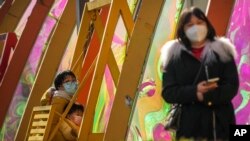Beijing —
China's National Health Commission announced on Wednesday the most significant relaxation of its COVID-19 prevention and control protocols since the pandemic erupted three years ago.
Rules covering quarantine, people movement, lockdowns and testing were loosened, and other aspects of policy were also adjusted.
The main changes are listed below:
- High-risk areas must be accurately designated by buildings, units, floors, and households, and cannot be arbitrarily expanded to residential compounds and communities.
- Mass COVID testing cannot be carried out by administrative regions. Scope and frequency of testing should be further reduced.
- Negative COVID testing results or health code checks are no longer required except in places such as nursing homes, welfare homes, medical institutions, childcare institutions and primary and middle schools.
- Checks for negative test results and health codes will no longer be required from people traveling to other places within China.
- Asymptomatic patients and cases with mild symptoms can undergo home quarantine, or voluntarily choose to isolate at a centralized quarantine location. Close contacts of cases can isolate at home for five days or choose to go to a centralized quarantine location.
- High-risk areas without new infections for five consecutive days should be released from lockdowns in a timely manner.
- Pharmacies cannot restrict online and offline purchases of over-the-counter medicines such as antipyretic, cough, antiviral and cold medications.
- All regions should focus on improving the vaccination rate of people aged 60-79 and accelerating the vaccination rate for those aged 80 and above.
- The classified management of key populations' health conditions should be strengthened. Elderly with cardiovascular and cerebrovascular diseases, chronic obstructive pulmonary disease, diabetes, chronic kidney disease, tumors, immune function deficiency and other diseases should be identified. Their vaccination status should also be examined.
- People's movement cannot be restricted in areas not deemed high-risk. Work, production, and businesses also cannot be suspended in non-high-risk areas. Those who work to ensure basic medical services and normal social operations are included in the "white list" management.
- It is strictly prohibited for anyone to block fire escapes, units' doors, or residential compounds gates. People's access to medical treatment and emergency escapes must be unobstructed.
- Campuses without outbreaks must carry out in-person teaching activities as normal, while supermarkets, canteens, sporting venues and libraries on campus should remain open. Those with COVID cases should precisely mark designated risk areas and ensure normal order of teaching and living outside these areas.





